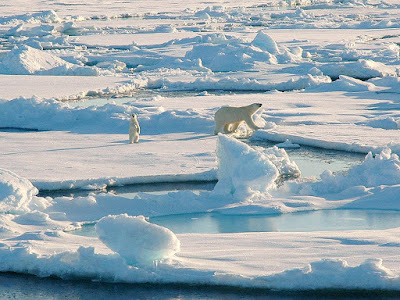 |
Your Daily English Programme #42: The North Pole (Listening B2-C1) |
 |
Think Before You Listen |
On September 6, 1909, American explorer Robert Peary sent word that he had discovered the North Pole 5 months earlier.
Does this mean the US now owns the territories in the North Pole? Who owns/should own the North Pole?
 |
Watch and Listen |
Watch the Video: What is the speaker's answer to the question: "Who owns the North Pole"?
 |
Let's Practice |
The text for the video contains quite a few useful collocations and expressions (highlighted in the transcript below) related to politics and the environment.
Before You Listen: Can you guess (or remember) what the missing words are?
Listen and check your guesses.
Listen and check your guesses.
(mouse over the colored words to see their meaning)
The North Pole is
over five million square miles in size and could potentially contain more
than 13% of the world's oil ________. Due to melting ice caps, it is
also a region that's becoming more and more accessible. So who owns the North
Pole and who has the rights to those natural _________? Well, as it
stands now, no one owns or holds political sovereignty over the North Pole.
But Russia, Canada, the US, Denmark and Norway have laid ______ to
part if, not all of it. Russia even went so far as to send a diving team in
2007 to plant a Russian flag on the ________ underneath the pole; and
there are reports that they've beefed up their military _______ in the
northernmost parts of the country to further establish that claim. So is that
it? Does the country with the most flags and lonely soldiers and long johns
get to claim the North Pole for themselves? No! That may work with _________ and
unclaimed land but the North Pole isn't even land. It’s just ice floating
in international waters; and there's a governing _____ that makes
decisions about international waters: the United Nations. Their Law of the
Sea Convention, which was ratified in 1994, establishes guidelines for who
owns which parts of the ocean. To put it into basic terms, each nation owns
the natural resources of any water or land under that water so long as it's
within 200 nautical miles of their ______, or up to 300 nautical miles
of their continental shelf. This is called their ‘exclusive economic
_____’. The problem with the North Pole is that it's covered in ice and we
don't know exactly what the continental shelf underneath it looks like, or
what ______ ice may uncover. There are already a few specks of land in
the area whose ownership is under dispute. We also don't know which sections
of the North Pole will become trade ______ …[that] are largely treated
as international waters and allow for free and unencumbered passage by all
nations. So Canada, for example, may have difficulty claiming the Northwest
Passage because other nations are already insisting that it is a valuable
trade route that can't be _______. All of these issues and more have
to be addressed and reviewed by the UN before a country can establish ________
to the North Pole; and putting together a claim and then getting it approved
is an extremely lengthy process. So the North Pole will most likely remain in
_______ for some time…
|
(see answers in the first comment below)
 |
Over to You |
Do you know of any other regions, sea or ocean waters in dispute around the world? Who has laid claim to them? Who do you think should own them? (type your answers in the comments)
Congratulations! You've successfully completed another lesson on Engramme. Let us know what you think of our posts and how they might have helped you.
Review the Vocabulary from this post HERE
Teachers can Download a pdf Copy of the post for classroom use HERE

Answers to the gap-fill exercise:
ReplyDeletereserves – resources – claim – seafloor (also: sea floor) – presence – uninhabited – body – shores – zone – melting – routes – blocked – ownership - dispute